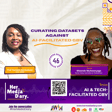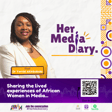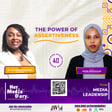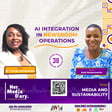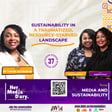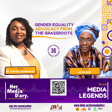Trailblazing in Education
00:00:05
Speaker
The university at the time that I went, ABC University, had been receiving
00:00:09
Speaker
a lot of visiting faculty from the U.S. So they were seeing a lot more male and white faculty coming into to Liberia. So I was the first Black woman to go and work in Liberia at that time. And that was so powerful for a lot of the female students, many of whom were either my age mates or older because, you know, the war had essentially dropped them off time. Yeah, disrupted their education.
00:00:38
Speaker
So I remember the first time that I met students, they said, no, no, no, no, no. We were expecting somebody different, a lot more older, a bit more gray hair, and you know, some thick glasses. So, and I was really tiny. I didn't have as much weight as I have now. One of the students raised up their head and said, before you start the class, could you put your credentials on the board? I said, very well, I'm happy to do that. And I put my credentials on the board.
Introducing Her Media Diary Podcast
00:01:12
Speaker
Welcome to another episode of Her Media Diary, a podcast that captures the lived experiences of African women working in media industries.
00:01:21
Speaker
I am Dr. Yamasi Akimobola, your host. And in this episode, I'm joined by Nancy Booker, who's an associate professor and the dean at the Graduate School of Media and Communications at Aga Khan University in Kenya. In this episode, Professor Booker and I discuss her experiences on climbing the ladder of leadership and teaching in different universities, both in Kenya and Liberia.
00:01:46
Speaker
whilst embodying what it's like to not be that traditional academic in the office. She will speak on the need for women to have networks and communities that propels them to stand up on those days when we just don't feel like getting up and I'm sure we can all relate to that. I certainly can. So throughout this four-part series, I'll be in conversation with African women academics in the field of media and gender studies.
00:02:12
Speaker
and discussing our experiences, and I say our because I'm an academic myself, our experiences in navigating academia, teaching and researching media and gender and those challenges we face and how we've managed to navigate our way despite the hurdles. So by inviting these voices into conversation, we hope to provide solutions to breaking down barriers faced by African women in media and in media
Virtual Connections and Women's Stories
00:02:44
Speaker
Professor Nancy Booker, it's a pleasure to be with you. I've never even met physically before because I feel we've known each other for so many years but I'm not sure whether we've actually met in person. No, I don't think we've met in person. Let me see, it's just been in all manner of spaces. I think there's been a lot of correspondence. The first time I typed your email on my
00:03:09
Speaker
I think I was sending you an email, your email just popped up. So it meant that we had been, I think you had been sending a lot of information my way or I was, you must have been an amazing list. So we haven't met in person and I hope that we can do that sometime soon. I know. So it's really a pleasure to have you on the podcast and hopefully I'm sure you've listened to a few episodes, the core objective is to get to know
00:03:35
Speaker
women's lived experiences in the media but obviously you're an academic in the media space and really it stems from the lack of kind of information about us online beyond the professionalism so I'm sure if we google the name Nancy Booker we're going to see all of your accolades who you are and stuff and you're going to tell me all about that but what we know less about is people's personal journeys and that's what we're really trying to achieve with the podcast so
Family Influence and Perfectionism
00:04:05
Speaker
I like to say, let's go way back, like to the earliest memories you have of Nancy, to growing up and just give us those kind of foundational understand of who you are. So I think my earliest memories is that I was, I was daddy's girl. I was born
00:04:27
Speaker
when my mother was just getting ready to go to college. And so I was born in November and my mother went to joint college in January of the following year. And so it just meant that I spent just under two months with my mother before she went back to college and she was a resident student. So I was essentially in my formative years raised by my father.
00:04:53
Speaker
And then by the time my mother was done with college, she came home and she had a second baby. So I think I cleaned on to my father even much more. And the critical piece to that information is that I think having a father figure who
00:05:15
Speaker
I was quite involved in my life, you know, has really shaped the person that I am today. I was told that, you know, I was a perfectionist at some point. My parents even wondered whether I would survive the, you know, kindergarten and early primary school. Because I wanted my things done in a particular way from a very, very young age.
00:05:42
Speaker
And my mother told me, my late mother told me that one time I went to school and somebody stepped on my white socks. And I refused to continue with class. I cried and they had to call my parents to come and get me from school. And from that point on, my parents would pack an extra pair of white socks.
00:06:07
Speaker
Yeah. So, yeah. I wonder where that's, I mean, this was this all in Kenya at the time. Did you grow up in Kenya? Yes, I grew up in Kenya. I grew up in Nairobi, the capital city. Yes. OK, so I wonder where that sense of perfectionist kind of stems from and this scene of of of the white socks and what did that mean for you? What was the and how is that kind of shaped things going forward?
00:06:37
Speaker
I think, you know, so my family is really rooted in academics. One of my grandfathers was a professor, you know, so and then my parents were in education. My mother, my late mother was in education. I have lots
Career Choices in Media vs. Teaching
00:06:59
Speaker
aunties and uncles who are academics. I have an uncle currently who's a Dean of Medicine, you know, so it's sort of like in the family. So growing in that space where you have all this academics, many of them, you know, trained abroad, must have had an influence. So growing up with, you know,
00:07:23
Speaker
One of my grandparents was an academic. I think by the time he retired from the university, he was a dean in one of the universities here in Kenya. And my mother was a teacher. And I have a long line of aunties and uncles who spend some time in the education space.
00:07:47
Speaker
So that, I think, in a way, shaped the person that I am today. And I need to say that I never in a million years thought that I would be in the academy.
00:07:57
Speaker
I loved the media space. I loved the glitz and the glam of television. And when I went to university, I studied communication, but with a heavy leaning on broadcast. And that's essentially where I started off. But my mother didn't really want me to be in media. I think she found it too
00:08:20
Speaker
Too fast-paced and aggressive for her fast-born child and her little girl. So she many times would say, I wish you could do something a lot more sober and contained, like being in the classroom. And for her, she felt that teaching was the noblest thing that anybody could do.
00:08:49
Speaker
So anyway, I started off in the media and I loved it. I loved the adrenaline rush. I loved just the the uncertainty of what the next hour was going to look like. And sometimes you are in the newsroom and it's a very quiet day and then something happens that just throws everything off balance.
00:09:11
Speaker
And that was the exciting, that was really, really exciting for me. And so I got to a point where I was thinking, you know, perhaps I could teach some of this, you know, and what could I do? I'm going to stop you there because we are getting onto the track of talking about you as a professional. That's great. And it's always interesting because these conversations usually just lead to that. Like everybody kind of gravitates to those tangible,
00:09:41
Speaker
kind of professional accomplishments. But I want us to keep kind of continue from what we were discussing about when you were growing up with your dad, your mom being, you know, studying and all that. What was that like for you? I always tell my friends that I didn't grow up and it's a joke. I usually say I didn't grow up, I was raised. And then they always ask me, what does that mean? What does that mean?
00:10:09
Speaker
And I say that, you know, I was nurtured. I was loved. I had two adorable parents. I think my mother was trying to make up for all the time that she was away and my father was, you know, just being a good dad to his child. And, you know, I grew up with parents who were friends of mine.
00:10:31
Speaker
Um, you know, so there were fast friends and then there were parents, which my siblings didn't have the advantage of. In fact, many of them who, you know, have all come after me sort of feel like I was a favorite child. My parents were more parents to them than friends, but you know, mine was, was a reverse. And I see the value in having, you know, a father figure actively involved in my life.
00:10:58
Speaker
because I come from a family of, you know, we are four girls and one brother. And the fact that I think my father had mainly daughters at a time when the boy child was prefiled
Challenging Cultural Norms
00:11:15
Speaker
sort of put some pressure on my mother. And she told us many times about the fact that at some point she really wanted to have boys because of society's expectation. But my father brought us up in a way that he said, what boys can do, you can do.
00:11:38
Speaker
and he always said he never looked at us as girls or boys he saw us as his children and so we had all the opportunities that you know he could provide he actually moved out of the ancestral land and bought land away from not very far away but you know away from the ancestral land because he said that
00:12:03
Speaker
You know, there'll be a time when he's not alive and he would want his children, boys or girls, to have access to all his property or all his assets and to call his home their home.
00:12:18
Speaker
So one of the things that I have done here, Missy, which is way out of what anybody would imagine, is that I've actually put up a house in my father's compound. And it was a talk of the village for a while, I can tell you. Yeah. I want us to dig deeper into this because there'll be listeners who do not understand the significance of what you're saying about the ancestral land and why your father had to buy another land. And then you build in the house in your father's compound.
00:12:44
Speaker
Tell us more around that, and especially from what you were saying about being mostly girls in your family. So in my community, it's the boy child who inherits the father's estate. If the father dies, it's the boy child that inherits the father's estate. And if you are on ancestral property, it goes without saying that your property gets passed on to the boy child.
00:13:13
Speaker
And so my father was looking at a situation where he has four daughters and one son and wanting all of us to have access to his property in the event that he's not there. And the only way out for him was to buy his own property.
00:13:33
Speaker
and to move away from the entanglements of ancestral land. And so buying his own property within the same community really gave him that freedom to decide what he wanted to do with it without the encumbrances that come with this is what is expected of him. And so with that,
00:14:01
Speaker
It then allows all his children, boys or girls, to have a say in his estates and to put up whatever they want to do. And so he divided his property, you know, amongst all his children. So I lost my mother.
00:14:22
Speaker
My father died several years back, and I lost my mother right at the height of COVID. And just before she died, she said, you know your father's dream was that you people have a stake in his estate.
00:14:38
Speaker
And if I'm not there, you have a right to this home just like your brother does, all of you. And so going by your father's wishes, it is our dream that you can put up a house here. And this becomes your sanctuary, the place where you can come and rest and recreate and connect with us as much as we are departed.
00:15:04
Speaker
And I said, but mom, girls don't do that here. And she said, but this was your father's wish. And he said that many times and you had it. So I actually went ahead and did that.
00:15:19
Speaker
Now, tell us that story because I can imagine that wasn't just as straightforward as it just went and did it, or was it? It wasn't. It wasn't as straightforward. It still isn't as straightforward. Never mind that, you know, I have a structure that's standing there and it's a beautiful home. First off, at some point, I've been, you know, wondered whether it would be ostracized from the community because there's something like that happens.
00:15:44
Speaker
And I think it is something that is slowly being adopted in a culture that is hugely patriarchal because the assumption is that girls get married. And when you get married,
00:16:00
Speaker
you leave your father's home and everything there, and you go and set up where you're married. Almost become another property elsewhere. Yes. Yes. But my father was very clear. He said, marriage will not stop any of us from having access to his estate. And so I guess because I'm not married, it was a lot easier for me to do it. And I told my uncles, you know, I'm here. I'm not going anywhere just yet. So I need a place where
00:16:30
Speaker
When I come, I can rest. And my mother's house is for her grandkids. And they said, no, no, no, no, you cannot do that. We may want to think a little bit about that. So I just went ahead and started the construction. And at some point, I even thought I would not get construction workers because many of them would be feeling this is not something that we do.
00:16:59
Speaker
But I had a great team of construction workers. You know, they worked on the house. They did everything that they could do. And today it has become, you know,
00:17:12
Speaker
the place where we all connect as siblings. My brother is also putting up a house and it will be up pretty soon. But the fact that I am there has created, even for my nieces, an example of what could be possible. And I remember one time going back to the village, we've talked a lot about this. I have one of my neighbors back there who has four daughters says, I just don't know how to start and I don't know what everybody's gonna say.
Mentorship and Leadership in Academia
00:17:42
Speaker
And I think this is one thing that stops a lot of us as women from taking the decisions that we want to take, where we are always looking beside or who's watching and what does this mean for everybody else. And I think the fact that I had very strong parents who, and a father figure, and I keep talking about this because it's important that you have the affirmation from a strong male figure
00:18:12
Speaker
such as a father. And I say that again with a lot of humility because I know that there are many women who do not have that advantage and they have succeeded. But I think for me, the affirmation, the constant affirmation from a father figure has really shaped who I am today. So I remember telling this neighbor of ours, you know, just start. And she said, no, no, no, what will everybody say?
00:18:38
Speaker
And I said, and she says, you know, we talk about your home. We talk about your parents' home and how different it is, you know. And I say, but do you sleep at night after you've talked about it the whole day? She says, yes. I said, you see, it doesn't matter. You're still able to sleep at night.
00:18:54
Speaker
and have a good night's sleep, and it doesn't bother me. So move on and do what you need to do. So when I think about our home in the village, I look at it not just as honoring my parents' wishes, but I also see it as an opportunity to showcase to the rest of the community and to the young girls there that they have a stake, they have a say, and they are a critical component of society.
00:19:24
Speaker
Because when culture shows you or explicitly requires that you need to be married and you need to go away, then it puts obstacles, it puts undue pressure
00:19:45
Speaker
that then oftentimes makes it difficult for women to succeed. And so you're always thinking about, where am I going to settle? What's going to happen if I don't get married? And where will my home be? So I don't worry about that. And it's given me so much peace to exhale
00:20:13
Speaker
in the other things that I am doing because it doesn't keep me awake at night. I have a home and I have
00:20:21
Speaker
and I have a home in my father's home. And that's important. And I suppose for your neighbor and many other women in your community, and I hear this story, that representation is really important because now they've seen this woman who can do it, right? And therefore, actually, it is possible. And this is how she did it. And so representation becomes so significant. And when we connect that back with your academic career and academic leadership,
00:20:51
Speaker
How is representation kind of, have you perceived the representation of you as the academic leader and the steps that organizations can take to enhance that and acknowledge and implement things that allow for women to be representational in academic leadership? That's a great question, Yamisi.
00:21:17
Speaker
First off, I always thought I should just be in the classroom. And that's what I like. And I must say that that's where I thrive. It's just one of those beautiful spaces to be in.
00:21:32
Speaker
And so I've had leaders and supervisors who have believed in me and who have given me lots of chances, even when I didn't think that I was the deserving candidate or that I had anything to offer. But many of them see perhaps what I do not see. And they have essentially propelled me, encouraging me
00:21:58
Speaker
supporting me, mentoring me to be the person that I am today. And when we talk about, you know, the representation of women in the academy, it is important that there are a significant number of women in academic leadership because then, you know, the rest of the younger women can see what is possible.
00:22:24
Speaker
You might not do anything much, but just the fact that there's a presence and they can actually see something that they can point to is important. And that allows them to dream and to see what can be possible if they stay the course. The reality is that in
00:22:47
Speaker
the context in which we operate, we do not have very many of those examples. AKU is a lot different. I mean, we are currently at, I think about 70% women in academic leadership. In East Africa, for example, we have four deans and three of them are women.
00:23:12
Speaker
And what I would literally consider younger women. So that's important. When our students, when I talk to my female students, they are encouraged to take on leadership positions. And there'll be instances where when somebody is thinking about whether they should even take up a leadership position in the newsroom, and they're a woman, and they'll call me. And they'll ask what I think.
00:23:41
Speaker
And then there'll be instances where some will reach out and they say, I'm struggling with something, you know, I need to speak to you so that I understand how to navigate this. That's important. So if I wasn't in, in that space, then, you know, they might not have as many places to go to, to just bound some of their ideas or express some of the challenges that they are facing and, you know, have some,
00:24:09
Speaker
you know, ideas on how they might resolve them. I mean, that's something I can completely relate with as an academic myself and an academic in a British university, where now it's not just even about my gender, but my race and ethnicity comes to play.
00:24:25
Speaker
And, you know, you have that kind of informal mentoring relationship with students that look like you when they kind of gravitate to the fact, okay, I can see this black woman that looks like me. Let me kind of connect with her. And I remember the very first time I attended graduation. I never used to go to graduation. It was just not something I used to attend, right? And it was never mandatory for us to attend. I remember the very first time I attended graduation.
00:24:51
Speaker
And for the first time, I recognized actually it was important that I was there because I was the only black woman on that stage, you know? And I remember afterwards, several young African Caribbean students come in to me and say, oh, it was so great to see that you are the only one that looked like us. And I even wore my Nigerian fabrics and stuff, you know? Somebody came up and said, I wanted to know who you are. You were wearing our Nigerian out, you know? So I think representation is so critical, especially in the environments where you're nurturing.
00:25:21
Speaker
a new generation, right? You're nurturing the next generation in the profession. And that's just something that's always kind of resonated with me and something I really connected with. And I was reading your profile. I never knew this about you, that you taught in Liberia.
Teaching Experience in Post-War Liberia
00:25:39
Speaker
And not only did you teach in Liberia, you set up ABC University's media and communication departments.
00:25:48
Speaker
Tell me about that. And this was post-ward Liberia, I imagine. Yeah? Yes. What was that like? So I think I'm a risk tinker. Some of the things that I have done in my life.
00:26:06
Speaker
But I always believed that if you don't take some of those risks, then you'd have a very boring life. So going to Liberia was an opportunity that was presented to me when I was working at Daste University. And I was seconded by the leadership then, the vice chancellor, to go and support this university in post-war Liberia. And I remember the first time he called me to his office to tell me about it, I said,
00:26:36
Speaker
What have I done? Why are you sending me into this place? Are you trying to get rid of me? Why are you sending me to do this? And he said, no, it's because we trust that you will deliver. So those words were important because I was able to go with a lot of confidence knowing that I had the support and the backing from my institution's leadership.
00:27:03
Speaker
Um, arriving in Liberia was not anything that I had been prepared for. I didn't, you know, we had read about the war, the civil war there, but you know, being in the country, it was very, very different.
00:27:18
Speaker
I think there are things that we take for granted just even in terms of daily access to food and personal items and realizing that it's not always automatic, especially when you are in a context that is just getting out of war. And I remember going into arriving on campus. It was a beautiful campus, heavily funded by the donor community in the US.
00:27:49
Speaker
I had a beautiful house. But the students, I think when they were told that there's this lady that is coming from Kenya and will spend time with us here for a duration of time, they had a particular image or perception of what I should outlook like. So they were expecting, and this, I think when we talk about representation and why it's important, the university at the time that I went, ABC University had been receiving
00:28:19
Speaker
a lot of visiting faculty or faculty from the US. So they were seeing a lot more male and white, you know, faculty coming into Liberia. So I was the first black woman, okay, to go and work in Liberia at that time.
00:28:45
Speaker
And that was so powerful for a lot of the female students, many of whom were either my age mates or older because the war had essentially robbed them of time, disrupted their education. And so beyond just putting together the communication program and setting up the communication program,
00:29:11
Speaker
I would spend my weekends in the communities going to social gatherings and speaking to the young women and to high schools. And it was so important for them because then they were able to see what they can be. But going back to what that was like, I think it was a very humbling experience. One of the things that I take away from it is that we do not know what peace is.
00:29:41
Speaker
until you are in a war situation. And I think I came back home a lot more grateful and very aware of what a disruption that is caused by civil war can actually mean for people. So I remember the first time that I met students, they said, no, no, no, no, no. We were expecting somebody different, a lot more older, a bit more gray hair.
00:30:11
Speaker
and some thick glasses. Which year was this? Which year was this? This was between 2009. So I was there between 2009 and 2012, on and off. OK. And I was really tiny. I didn't have as much weight as I have now. At least now I have a bit of gray hair. And I didn't have any gray hair then. I have some there. I didn't have any gray hair then. And in one of the first classes that I went to teach, which was
00:30:41
Speaker
an English class for communication students. They said, one of the students raised up their hand and said, before you start the class, could you put your credentials on the board? Wow. Okay. Okay. How do you react to that? What was your response to that? I said, very well, I'm happy to do that. And I put my credentials on the board. And then I said, is there anything else you want to know? And they said, no.
00:31:10
Speaker
So I didn't fight back, you know? Yeah, I didn't fight back. And I said, you know, we are here to benefit from each other. There is a lot that I'm going to learn about you. I spoke about what I do not know about, you know, their culture, their country, the gaps that I had. And I said, I'm relying on you to help me through this journey. And I had so much support because I was vulnerable enough to
00:31:39
Speaker
you know, just come out and say, I may be the teacher here, I might be the subject matter expert, but this education is taking place in a context that I'm not familiar with. And I need your help to help me contextualize a lot of the work that we'll be doing. And it was a great time. It was a wonderful time. Yeah. And you said that you did a lot of work with the community as well. Tell me more about that. So, um,
00:32:05
Speaker
I had a lot of speaking engagements, you know, in high schools to senior year students, you know, talking to them about different careers, about university education, and the value of education and what it does in terms of equalizing all manner of, you know, people, irrespective of your economic or social standing in the communities. And that was, that was important. I learned how to wear, and I think that's where my appreciation of
00:32:35
Speaker
the African dress comes from because my students would laugh at me and they would say, we're taking you to this event and you're speaking, but you cannot show up like that. And so they would take me to the market and you would buy African fabric and they make it really fast for some reason, they would tailor it really, really fast. And I have all these pictures of me in, you know,
00:33:01
Speaker
African fabric looking really lovely, you know, because it was important that I not only represented them in color and gender, but also in dress so that they could relate with me. Yeah. So now if we step a bit back in terms of your career journey, did you go straight into academia? I think you spent some time in
00:33:31
Speaker
broadcasting and the media itself. How did you get into that? What was your experience?
Transition from Media to Academia
00:33:37
Speaker
I got into the media through my internship as an undergraduate student and you know they thought I did too so well and so they they kept me on after that so I would balance my final year and work and then you know after I finished I
00:33:53
Speaker
continued working for, you know, KBC, which was the public service broadcaster, still is a public service broadcaster. And then I also had a stint at the Nation Media Group when they were setting up their broadcasting division. But the interesting piece to it is that I didn't stay there for too long because at the time when I was graduating with my first degree, one of our
00:34:20
Speaker
best lecturers in broadcast journalism was going to the US for his PhD. And so the university had tried to recruit somebody to take on his position and they did not succeed. And so they had this brilliant idea of why don't we develop our own talent?
00:34:41
Speaker
And so I got a scholarship to come back to the university and pursue my master's degree and start off as a graduate assistant. And that's where my academic journey started. Okay. So at this point, had you, because I know you'd said you'd come from a long line of academics, but at this point, had you kind of envisioned this as a potential career journey? No. And just to say to our listeners that
00:35:08
Speaker
Nancy had this kind of like hellnut kind of face on her. So, I mean, what was your mindset then at that point when you then found yourself in this space? Like, what was it like? Let me just say this, that, you know, the reason why I took up that opportunity was I thought, somebody's paying for my master's. So, why not?
00:35:30
Speaker
You know, yeah. Yeah. I said, you know, somebody is paying me to go to school. I mean, that's, that's brilliant. So let me, let me go to school. And then after I'm done with school, I will work for a certain period of time to, to pay back. And then I can go back to what I love, you know, and I would see how my mother would, you know, sit at home late in the night and should be
00:35:56
Speaker
greeting papers and working on lesson plans and all manual things. And I said, this is all the sort of life that I want, you know. Where was your mum working? So my mum was a primary school teacher. Yeah, she was a primary school teacher in Nairobi.
00:36:11
Speaker
you know, for the longest time and then, you know, retired into, you know, one of the schools in the village when she got close to retirement. Yeah. So you're telling us about that, you know, journey. So from being a graduate assistant, how did then, at what point were you convinced actually this is a potential area for you? Every time I walked into the class and I saw
00:36:38
Speaker
the students' eyes light up and we had great conversation. And I was talking to them about stuff that I was passionate about. And I would bring real life examples because I was coming from a media space and I would bring real life examples and their eyes would just light up. I felt so excited. And then they would do the evaluations at the end of the semester and they had all these wonderful things to see. And we had an interesting award
00:37:06
Speaker
at Dacie University there, then where students would award the best lecturer of the year. And I got, you know, I got awarded and I said, you know, at least this, this is a, this is, this is a job where you feel appreciated. You know, students will tell you, thank you for teaching. And many of them will come back and
00:37:28
Speaker
they'll recognize you in the streets and in the grocery store, and they'll say, you are my teacher, and they'll introduce you to their families. And I said, well, this is great. The newsroom is tough. I'm just as good as my last story, and that's it. And obviously, this is now how many years later you are associate professor and dean at the Graduate School of Media and Communications at Aga Khan University.
00:37:53
Speaker
How did you make that transition to leadership? What was that journey like for you in getting to this, not yet peak, because there's still many more layers to go, but you're at a significant level in your career. So I stayed on.
00:38:10
Speaker
We all know that in the academy you publish, you bring in a couple of grants, you supervise. And then in 2012, January, I got to a point where I said this was almost six, seven years after I had completed my master's degree. And I got to a point where I needed something different.
00:38:40
Speaker
And I changed jobs. I went to a different university. And at that point, it was a young university. And I said, I'm excited about growing things from the ground up. I had done it in Liberia. I had just come back from Liberia. The experience in Liberia was quite rewarding. And so coming back to settle to the status quo was difficult for me.
00:39:10
Speaker
some more excitement. And I guess for me, the excitement comes from, you know, working in institutions that, you know, you basically are involved in building from the ground up.
Academic Leadership and Establishing Institutions
00:39:24
Speaker
So I left and I went to Multimedia University of Kenya. I left DISTA and I went to Multimedia University of Kenya. DISTA was great. It has shaped a lot of who I am today. And
00:39:36
Speaker
All my three degrees, my undergraduate, my master's and my PhD are from there. And I've had, you know, great supervisors, you know, throughout and mentors throughout my academic journey. A lot of them, you know, local, but very many of them also from different parts of the world.
00:39:59
Speaker
So I joined multimedia university and, um, in January of 2012 and, uh, and then in six months I was made the chair of the department. And I said, wait a minute. I was not having here to do administration. Yeah. And, and, you know, I was joining them at a time when I was actually, I had just started my PhD. So I had, you know,
00:40:27
Speaker
I had this mindset that because it's a public university, I have all the freedom and I can just teach my classes and go into my PhD. And it was a young university. You know, the communication program was the faculty of media communications was just launching, you know, new programs or was in the process of thinking about new programs. So I thought I could support with that and study and just
00:40:56
Speaker
stay under the radar and quietly just do what I need to do. And so in six months I've made the chair of department and, you know, and all my plans go out of the window. And so now I have to, I have to lead a department. I have to, I'm aggressively involved in coming up with new programs and student recruitment in faculty development. And I was there for five years. I did that for five years.
00:41:26
Speaker
You know, I graduated with my PhD while I was working there. I had great support from again, you know, the leadership because they gave me those seasons when I would actually just completely take time off to go and concentrate on my studies. And then I said, you know, I need something that's exciting. And so the Agakani University opportunity came calling
00:41:54
Speaker
And at that point I was, I said, I'm tired of administration. I just want to go and sit somewhere quiet and just teach my classes and do my research and go home and, you know, play with the dogs in the evening and have an easy life. And do some marking. Do some marking. And, yeah. Well, I joined the KU. Let's just say that I did that.
00:42:23
Speaker
And, you know, that holiday did not last for too long. So in about five months, I became the program coordinator for the Master of Arts in Digital Journalism. And then I became Director of Academic Affairs about, you know, one and a half years later. And then I became Associate Dean. And then I became Interim Dean.
00:42:52
Speaker
And now I'm the team. Yeah. I mean, if we can obviously, all of those steps where I imagine steps of labor and love and nights of tearing a hair out and it was just, it was not as smooth as kind of, I did this, a year later I did this, that kind of stuff, right? What was it like? What was the reality for you? That it's a journey. It doesn't come easy.
00:43:21
Speaker
you have to put in the work and you have to, you know, in whatever roles that I had, I gave it my best shot. And I did it with a lot of passion and commitment. And when you do that, you then, you know, some of those things just, just happen.
00:43:46
Speaker
But it's not that you're not investing in the work. And I think it's important for us to all understand that you have to put in the work. It's as of work. It's working with a lot of commitment and dedication. It's giving it your best. And I sometimes imagine, the reality is that
00:44:15
Speaker
women actually put in a lot of work. And I have put in a lot of work to get to this point. And it's important that we understand that it doesn't come as easy, you know, as we all imagine that it would. That work would mean that
00:44:33
Speaker
You're not only teaching, you are supervising students, you are pursuing grants, you are working in the professional development area, you are engaged with the stakeholders and networking, you know, with the industry in a big way so that the training and education that you are providing is relevant and is addressing the needs of the community. And there'll be times when you will fail at it.
00:45:04
Speaker
But recognizing that you have an opportunity to get better and to learn and improve is also important. It also means that you're also serving the community and you can define the community in various ways. And for me, what that service to the community has been is a service to the media profession.
00:45:29
Speaker
You know, I've served in the Kenya Editors Guild in very many of the subcommittees. And I just stopped doing that when I became the Dean. I have served professional associations, you know, with, has no monetary return. But the experience and the networks that it gives me is something that money cannot buy.
00:45:59
Speaker
You know, I served in the Media Complaints Commission for three years, you know, from 2020 to late last year. And, you know, it was a labor of love. But when you see the decisions that you make that then save media houses, you know, huge penalties or the mediations that you conduct that, you know, you can work out of
00:46:26
Speaker
a dispute situation and both parties are shaking hands and they're saying, I can do with an apology. And that's good enough. It's very rewarding. Yeah. I think what I'm getting from your story is that there's a combination of passion is very clearly a key thing there, right?
Overcoming Self-Doubt and Career Growth
00:46:45
Speaker
Passion and the experience of perhaps also going to different institutions in different environments like you went to Liberia.
00:46:53
Speaker
You spoke very well several times around those people who were always your supporters, always kind of seeing the potential in you, but also kind of not being the traditional academic in the office and having your hands in a bit of everything. So there's a combination of elements that's kind of led to your progress. And you just spoke about your time at the commission.
00:47:23
Speaker
Being a woman in such spaces, what is that experience like? Because it's one thing to have, well, one thing to even get a seat on a table, one thing to have your presence at the table been acknowledged and been useful, one thing for it to, you know, impact communities and societies, as you said. So what are those experiences like for you and what was the reality for you?
00:47:47
Speaker
That's a great question. So when I joined the Media Compliance Commission, this is a quasi judicial outfit that adjudicates on disputes and mediates on disputes that are media related. And so I applied for it. But at the point at which I was applying, I said, I don't think I had a chance, but
00:48:08
Speaker
I'll throw in my application anyway. I have no background in law. You did it anyway. And that's the key thing, right? Doing it anyway. Yeah. I did it. I said, what's the worst that can happen? They're not shortlisted. They'll not interview me. That's fine. It doesn't take anything away from me. And I completely forgot about it. And I moved on with my life. And then I see that I've been shortlisted. And I go in for the interviews.
00:48:33
Speaker
What I did before the interviews was that I spent a lot of time talking to my brother, who's a lawyer, and I read some of the previous cases that had been, or determinations from the previous commissions. And I went into the interview. And of course I understand the journalism landscape. And so when I was selected from, because I think initially we were about 280 applicants,
00:49:01
Speaker
They shortlisted to 28 and then they picked the best seven. And I was selected among the top seven. So the lesson that I learned from that is that if you do not take the opportunity or seize the opportunity, who will know that you're there? And I've done this by self as well. Sometimes I'll see an opportunity and I'm like, I don't think I'm the person for it.
00:49:28
Speaker
I don't think I have everything. I don't tick all the boxes. Let me tell you, I have learned that men will seize the opportunities even when they do not meet half of that criteria. Absolutely. But for us, we want to make sure we have everything aligned. And if we have one shortfall or what we imagine is
00:49:53
Speaker
is a shortcoming, then we say it's not for me. So I would never have had the privilege of serving in the Complaints Commission if I did not take the first step of applying. And I remember even through that application journey, I was saying, you know, I don't think I'll get it. And I said, well, let me just do it and get it out of the way and then I'll be OK. And there have been instances, again, you may see where I've given up
00:50:21
Speaker
And I've just said, I don't have the time. I don't have the energy. I will not do this. What keeps me going is because sometimes people will push me and say, you have to go for it. Yeah. So there'll be times when I do the things that I do to silence those in my network who are propelling me to those
00:50:48
Speaker
positions or to those roles. And so I'll just do this so that, you know, Yemisi can get off my back. And we need that kind of support circle, don't we? Because you have moments, like you said, moments of self-doubt, moments where you just kind of
00:51:09
Speaker
wonder why you're even doing it, right? And you need those people to kind of remind you that you can do it and why you're doing it and just kind of be that push and that nagging voice. Yeah, you know, and I mean, a good example is the chapter that, you know, you asked me to contribute, you know, I would block time out, say this weekend, this is what I'm doing.
00:51:29
Speaker
And then something just comes up and I'm not able to, you know, there's nothing as difficult as being a dean who's also trying to, to ensure that their academic trajectory is on course, you know? And at some point I gave up, I said, you know what? It's okay, I cannot do this. And every time you send me a message and you ask, how much time do you want? I was like, goodness, I cannot get your PC off my back.
00:51:59
Speaker
I'm not going to let you off this time. I'm going to try how much time. It's because I know that he's going to produce good work and I understand how busy you are, right?
00:52:11
Speaker
So it's important that we have those networks. Yeah, I just said, and I tried like, you know, I tried to get some of my interviews arranged and everybody's just sort of break or people are not responsive. And I was getting so frustrated. I said, you know, I cannot do this. And, you know, and I think the lesson I have learned from all that is that as women,
00:52:33
Speaker
We need that network that pushes us and propels us even when the last thing we want to do is to get up. There has to be that community that holds you up and propels you up.
00:52:51
Speaker
You know, on those days where you feel like I do not want to wake up. I don't want to draw my curtains. I don't want to see the world. There has to be that community that gets you up. And some of those members of that community are people that you intentionally seek out. And others, I say they are people that God just brings you away. Yeah, absolutely. And you know, one thing I've experienced this year is
00:53:19
Speaker
the importance of times when things don't go right, when maybe you don't quite get it right, especially as a perfectionist, right? When you don't quite get it right. And the lessons you learn from those moments, because actually sometimes you need things to kind of go a little bit wrong to remind yourself why you're doing what you're doing, all right? And why you love what you're doing. Yeah. Yeah. And I think that works hand in hand with this community that holds up. So as we round up our conversation, Nancy,
00:53:50
Speaker
Thinking about your journey to where you are now and thinking about your position and the experiences you've had at different levels, different environments and stuff. When you think about academia, academic institution and the opportunity there is to better support that representation of women at different levels, whether in the classroom, in leadership, et cetera. You have power in your hands to kind of do some of those things where you are.
00:54:18
Speaker
So what are some of the things you've been doing or that you think needs to be done in terms of having adequate structures and policies and support systems in place for women to take leadership in academia?
Mentorship and Representation in Academia
00:54:29
Speaker
Some of these things happen by default and others, you know, then you, you know, by design. And I think for me, the mentorship is a critical piece to it and not just mentorship, but culturally relevant mentorship because, uh,
00:54:48
Speaker
you know, for women in the academy, you will be working in various cultures. And part of what I mean by culturally relevant mentorship is that I'm able to provide mentorship in a context that I understand what the realities are. So when when I've been involved with mentorship and some of my students or
00:55:18
Speaker
And I mentor women who are sometimes not even my students, is that I'm aware of the realities that they're confronting in the newsroom. I have the data that speaks to the realities in the environment. We are doing research with, for example, just concluded a study on the state of the women in media in East Africa. So that gives me not just the confidence, but also
00:55:47
Speaker
the data to support some of the things that I am doing. And that's what cultural relevance is for me. So it's great to be mentored across, but it's also important that there are some of those within your mentorship journey that understand the realities of what it actually means. So for example, putting up a housing
00:56:13
Speaker
in my father's compound is something that somebody in a different context would wonder, what's the big deal about that? But it is a very big deal in the culture that I'm operating in. But the other thing that I have intentionally done is that I actively seek out women
00:56:34
Speaker
to be involved in the research work that I do, to join us either as adjuncts or full-time faculty, and to take on various leadership roles in and out of the academy. The other thing that I do is that there are times when the last thing I want is to be invited to a speaking role.
00:57:04
Speaker
Yeah, and, you know, so it's a Twitter space conversation and it's happening from 8pm in the evening at the end of a long day, you know, where the entire time I have been looking at the numbers.
00:57:18
Speaker
And they just don't add up. And I just want to go home and sleep, but I have to show up, you know, because if I don't show up, then it's that somebody will not see that representation and it's going to disadvantage them. It's, it's quite a tall task, isn't it? Like you said, you're, you're tired. You just want to say no, but actually this, you take on this responsibility that my saying no is going to,
00:57:48
Speaker
mean that either that space is not occupied by a woman or somebody that needs to see me doesn't get to see me. And it's quite a big way to carry on one's shoulder, isn't it? So, Nancy, thank you so much. It's been such a pleasure kind of getting to know you, even though we've kind of known each other for years, but I think we've had such a lengthy conversation before. And I guess what's next
Reflections and Future Aspirations
00:58:11
Speaker
Am I going to see a Vice-Chancellor Nancy Booker anytime soon? I honestly don't know what's next. I'll keep doing what I am doing now and I'll do it to the best of my ability and I will wait to see what comes up next. Brilliant. Thank you very much Nancy. It's been a pleasure. Thank you. Thank you very much. It's such a pleasure talking to you. Thank you too.
00:58:40
Speaker
It is great hearing Professor Booker encouraging us to show up regardless of the circumstances so that we can inspire others, especially other women, on the possibility of attaining great heights. What Nancy suggests is this idea of a culturally relevant mentorship. And I think that's really quite important in an era where we are trying to empower others through our own lived experiences. So it's interesting to hear her thoughts around this notion of
00:59:10
Speaker
culturally relevant mentorship and that is important because if you are mentoring and supporting others you've got to understand and come from the context in which their experiences come from and it's particularly important in how we support other women to occupy leadership positions in academia and other fields as well and in their areas of life.
00:59:31
Speaker
So I'd love to hear your thoughts on this. Drop me an email at GMC at AfricanWomenInMedia.com with your thoughts. And also if you'd like to join me on an episode of Her Media Diary and you can use the email address as well. So to find out more about African Women in Media and our work, visit our website at AfricanWomenInMedia.com. And in the show notes, you'll find a list of organizations and resources.
00:59:56
Speaker
that can support you if you have experienced any of the topics we've discussed today. And don't forget to join the conversation using the hashtag hair media diary.
01:00:08
Speaker
Heminga Diary is a product of African women in media, an NGO advocating for gender equality in the industry. And this episode was hosted by Dr. Yemisa Kimpobola, produced and edited by Blaise Nojeobasi as part of a four-episode series on women in academia. All music featured in this podcast is by Nana Poppena. Thanks for listening and join us again next time.






